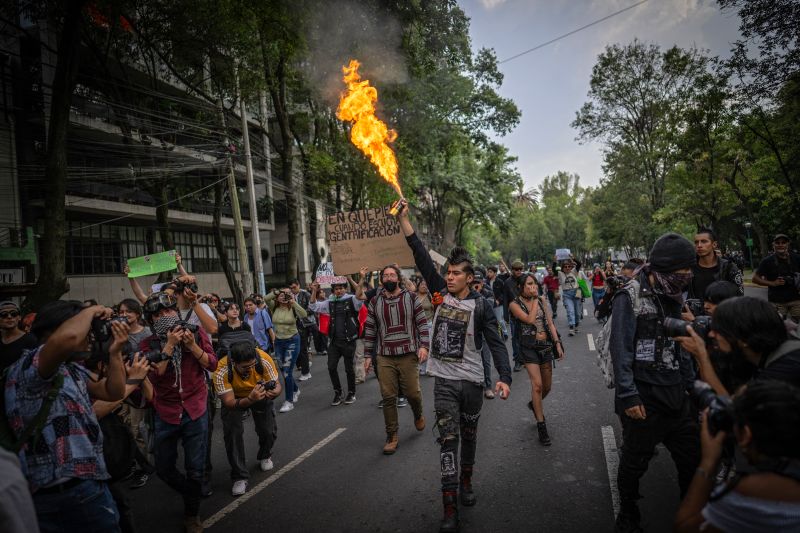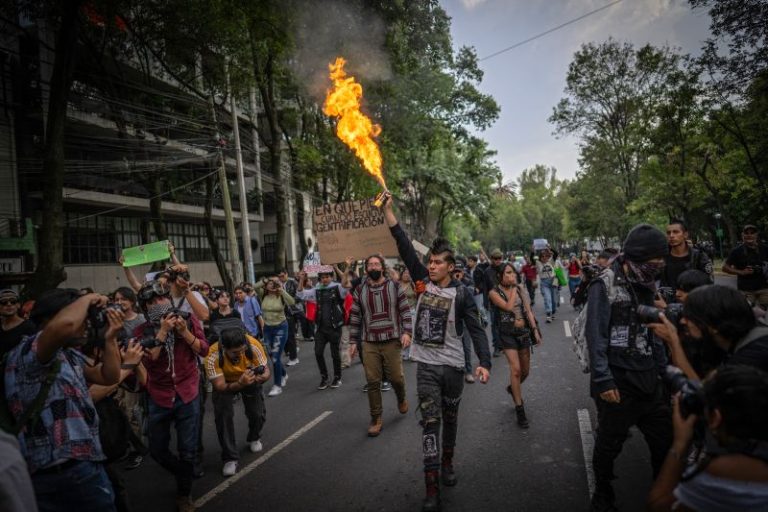
The words “Get out of Mexico” are still visible on one shop window as protestors violently kicked in the glass pane. In another clip, “Kill a gringo” is spray-painted on a wall in Mexico City as demonstrators carried placards demanding western foreigners “stop stealing our home.”
These were some of the striking scenes at a mass protest last week against gentrification and the rising cost of living in the Mexican capital city, which some have blamed on an influx of foreigners from the United States and Europe.
While the demonstration was largely peaceful and reflected growing anger about inequality in the Mexican capital, those who vandalized stores in the city’s wealthier neighborhoods and used anti-immigration language were criticized by Mexican President Claudia Sheinbaum as being xenophobic.
“No to discrimination, no to racism, no to classism, no to xenophobia, no to machismo, no to discrimination. All human beings, men and women, are equal, and we cannot treat anyone as less,” Sheinbaum said at a Monday press conference.
The US Department of Homeland Security, which has been carrying out an immigration crackdown in the US, reacted to Friday’s protests with an ironic post on X: “If you are in the United States illegally and wish to join the next protest in Mexico City, use the CBP Home app to facilitate your departure.”
The rallies in Mexico City mirror protests that have erupted in cities like Barcelona and Paris against skyrocketing costs, which have been blamed on overtourism, short-term home rentals, and an influx of people and businesses with higher purchasing power.
Frente Anti Gentrificación Mx, one of several groups that helped organize the protest on Friday, compared gentrification on its social media to a new form of colonization in which “the state, institutions, and companies, both foreign and local, provide differential treatment to those with greater purchasing power.”
Anti-gentrification activists say thousands of people in the Mexican capital have been forced out of their homes in recent years as tourists and remote workers, many of whom are believed to be American, take over popular neighborhoods like Roma and Condesa.
But a spokesperson for Frente Anti Gentrificación Mx pushed back against Sheinbaum’s suggestion that their campaign was xenophobic, saying the demonstration was meant to highlight the plight of those priced out of their homes and to demand reforms from the government.
“In Mexico, housing costs have risen 286% since 2005 … while real wages have decreased by 33%,” said Morales, citing data from the National Institute of Statistics and Geography and the Federal Mortgage Society.
She acknowledged that many people have been moving to Mexico for a variety of reasons, from the appeal of its culture to the relative affordability of its houses. At the same time, she urged potential newcomers to consider how such a move could affect the local community.
Not a new phenomenon
Immigration is not the sole cause of Mexico City’s gentrification, which is a phenomenon that has happened for decades, say experts.
“In the debates, there’s a confusion about gentrification being when foreigners arrive. And that’s not true,” activist and lawyer Carla Escoffié said, noting that other causes include inequality, deficiencies in housing policy and land privatization.
“Not all foreigners gentrify, nor are only those who gentrify foreigners, nor is a significant migration process necessary for gentrification to occur. Gentrification is based on inequalities in such a way that it’s not the same thing,” she added.
But the arrival of short-term rentals like Airbnb, and remote work policies during the pandemic, have turbo-charged the gentrification debate in recent years.
“Since 2020, a new phase of gentrification has begun, one that has worsened,” said Escoffié. “It’s been driven by digital nomads and short-term rental platforms like Airbnb.”
Airbnb defended its activities in Mexico City on Tuesday, saying it helped generate more than $1 billion in the local economy last year, and arguing that guests who booked accommodations also spent money on shops and services in the capital.
Mexico City’s government signed an agreement with Airbnb and UNESCO in 2022 to promote the capital as “a global hub for digital nomads and creative tourism.” Sheinbaum, who was the mayor of Mexico City at the time, presented the initiative as a way to boost the local economy.
The appeal was especially attractive for US citizens, who can stay in Mexico without a tourist visa for less than six months before requiring a special temporary residency permit, according to experts. In 2022, 122,758 temporary residency permits were granted to foreigners for Mexico, according to the National Institute of Migration, up from 97,825 in 2019.
But for many residents, the Mexico City initiative was another sign of the displacement happening around them.
A global trend
Anger about gentrification is not unique to Mexico City. Local governments from tourist destinations in Europe, such as Spain’s Canary Islands, Lisbon and Berlin, have announced restrictions on short-term rentals in the past decade.
Barcelona’s leftist mayor, Jaume Collboni, said that by November 2028, the government will scrap the licenses of the 10,101 apartments currently approved as short-term rentals in the popular tourist destination.
Residents in the Catalan capital have documented how renting by the day is more profitable for landlords than renting by the month, which has triggered evictions and the transformation of homes into short-term tourist accommodations.
In Mexico City, Airbnb has over 26,500 listings, according to the rental platform, many of which are concentrated in the areas most affected by gentrification. These listings are concentrated in the central neighborhoods of Condesa, Roma, Juárez and Polanco, according to Inside Airbnb, a project that provides data about Airbnb’s impact on residential communities.
In response to mounting criticism and the protests of 2022, the local government introduced new regulations, but experts argue they fall far short.
Airbnb, meanwhile, says the city needs regulations that support home sharing, not prohibition. It argues that many people in Mexico City rely on the platform as a financial lifeline, with 53% of its hosts saying the service helped them stay in their homes and 74% of hosts saying it helped cover essential expenses.
Activists are now bracing for when Mexico opens its doors to soccer fans for the next World Cup in 2026, which Morales fears could result in the state prioritizing business dealings over residents. “Given the critical state we’re in, who would come up with this?” she asked.

